New to Dutch oven cooking? Or just want to get better at it?
These tips might help
by Leon Pantenburg
The best cooking tool for preppers, survivalists, campers and foodies of all types, IMO, is the cast iron Dutch oven.
For hundreds of years, cast iron has set the standard for utility, durability, even cooking and taste. The 1803 Lewis and Clark expedition relied heavily on cast iron cookware. A Dutch oven was considered standard equipment by the travelers on the Oregon Trail.
And so it goes. Today, one of the best preparedness items you can buy is a cast iron camp oven.
But – maybe you haven’t been having much luck when it comes to the actual cooking. Check out these ten tips for improving your Dutch oven cuisine.
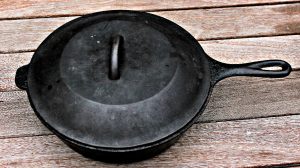
This Lodge 10-1/4 inch chicken fryer has been used constantly for more than three decades.
Get good cast iron: Cast iron is an investment. I still use a skillet my grandmother got as a wedding present in 1910. I use my deep dish chicken fryer at least weekly.
Some of cheap imported cast iron is unevenly cast, making for hot and cold spots when cooking or baking. The lids might not fit well, and cause a problem getting a good seal. Not to mention, some of the imported utensils may use iron that is highly suspect.
If you stick with it, you’ll eventually go to premium cast iron anyway. You might as well get it sooner rather than later. Get Lodge or Camp Chef brand cast iron, and you’ll never regret the investment.
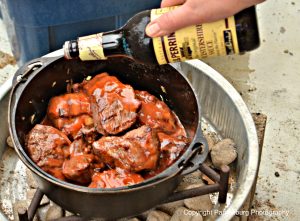
Almost any metal pan will work to help concentrate the coals and reflect heat.
Season cast iron correctly: Your food is going to taste bad unless the utensil is well-seasoned. Seasoning isn’t hard – you just don’t want to do it inside, since the process can get smoky. Here’s an easy way to season your cast iron on a barbecue grill.
Carry fire pans: Fire pans are metal pans, and they can be just about anything. I use metal dog food pans I got at the feed store. The pans reflect heat to the oven, and most importantly, keep the coals from getting smashed into the ground or going out because of moisture.
Cookbooks: There are many good Dutch oven cookbooks on the market, and the internet has many, many DO recipes. Find a simple recipe to start out with, and practice on it to get your heating down. Then progress on to more complicated dishes.
Learn heat regulation: A critical component to successful cooking is regulating the oven’s heat. This will vary widely, depending on your elevation, humidity in the air, outside temperature, etc. You’ll just have to experiment. Start with charcoal – a ballpark figure is that each lighted briquette will contribute about 25 degrees. See what it is for your area.
A general formula that works for me is this: Take the diameter of the oven, say 10 inches. Multiply the diameter times two. That means use 20 coals. Take two from the bottom and put on the top. That should give you about 350 degrees. This same formula works on bigger and smaller ovens.
Heat will vary, depending on how long the charcoal has been lighted, and the quality of it. This is another of those things to experiment with. At hunting camp, we’ll use coals from the campfire. Open the lid every once in a while to check on the progress.
Get the right accessories: It doesn’t cost much to get everything you’ll need to cook outside in your DO. These include a trivet to put the lid on, metal pans, fire tongs and a lid lifter.
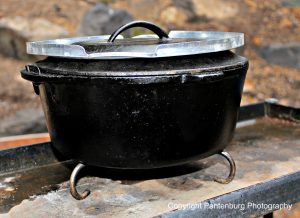
A pie crust saver and trivet can convert an indoor oven into an outdoor baker.
Use indoor cast iron outdoors: You may already have a cast iron pot or skillet you use inside. All you need is a trivet and pie crust protector to use it outdoors with charcoal. Here’s how.
Practice: Folks on the frontier used their cast iron every day. Make cast iron part of your regular cooking inside, and it will be no problem to transfer outside. I use my 10-inch deep dish chicken cooker and top several times each week, and have done so since I bought it new at Mississippi Hardware in 1983.
Join a Dutch oven cooking club: There are probably many people in your area who either cook in DOs or want to learn how. Start a club, if there isn’t already a local one. Contact the International Dutch Oven Society, and they can guide you through the steps of getting started.
Once your club is formed, cook at community events or sponsor cookoffs. Hold monthly DOGs (Dutch Oven Gatherings). These are a great way to make new friends, share knowledge, try new dishes and techniques and learn new skills. And the food is incredible!
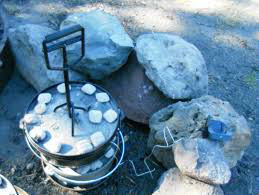
The right accessories can make Dutch oven cooking much easier.
Volunteer to cook at events: With seven siblings and their families, any of my family gatherings are big. The meals are typically cooked outdoors with grills and Dutch ovens. This is one of my favorite activities – we team up, and half the fun is coming up with new dishes.
The younger family members participate, and it’s a great way to form family bonds. If your church, civic group etc. has events, they’ll welcome cooks who are willing to teach others. It’s a good time to practice and meet new friends.
Leon Pantenburg is an avid Dutch oven cook, judge, teacher and a charter member of the Central Oregon Dutch Oven Society. Along with team mates Linda Stephenson and Michael Pantenburg, he has been a two-time finalist in the International Dutch Oven Society’s World Championships.
Please click here to check out and subscribe to the SurvivalCommonSense.com YouTube channel, and here to subscribe to our email update – thanks!

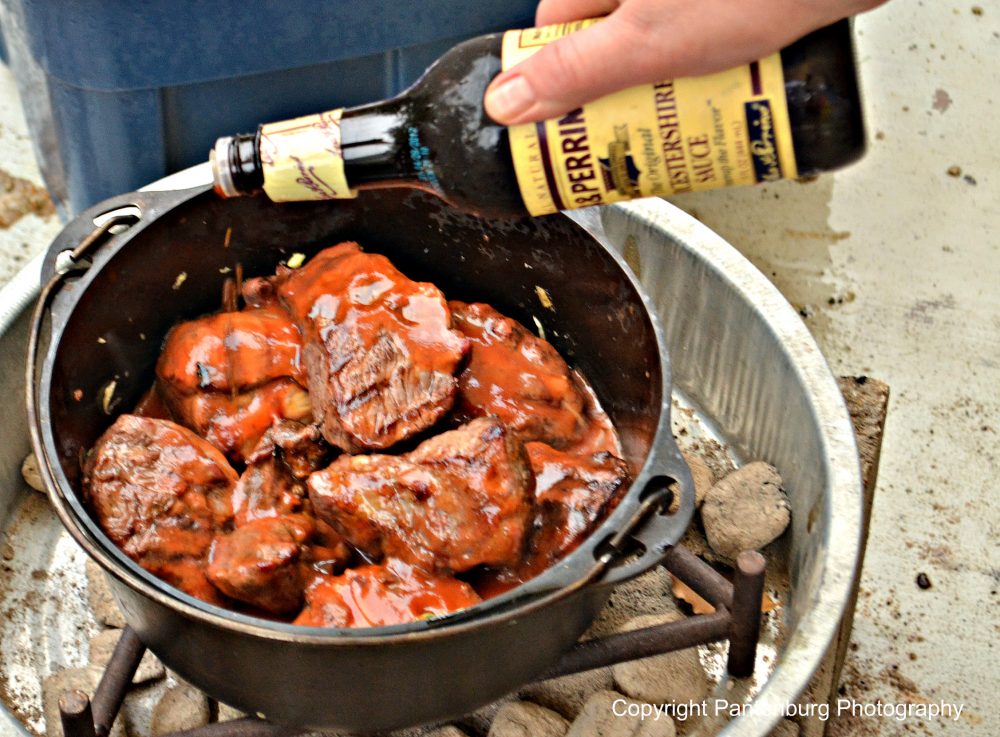
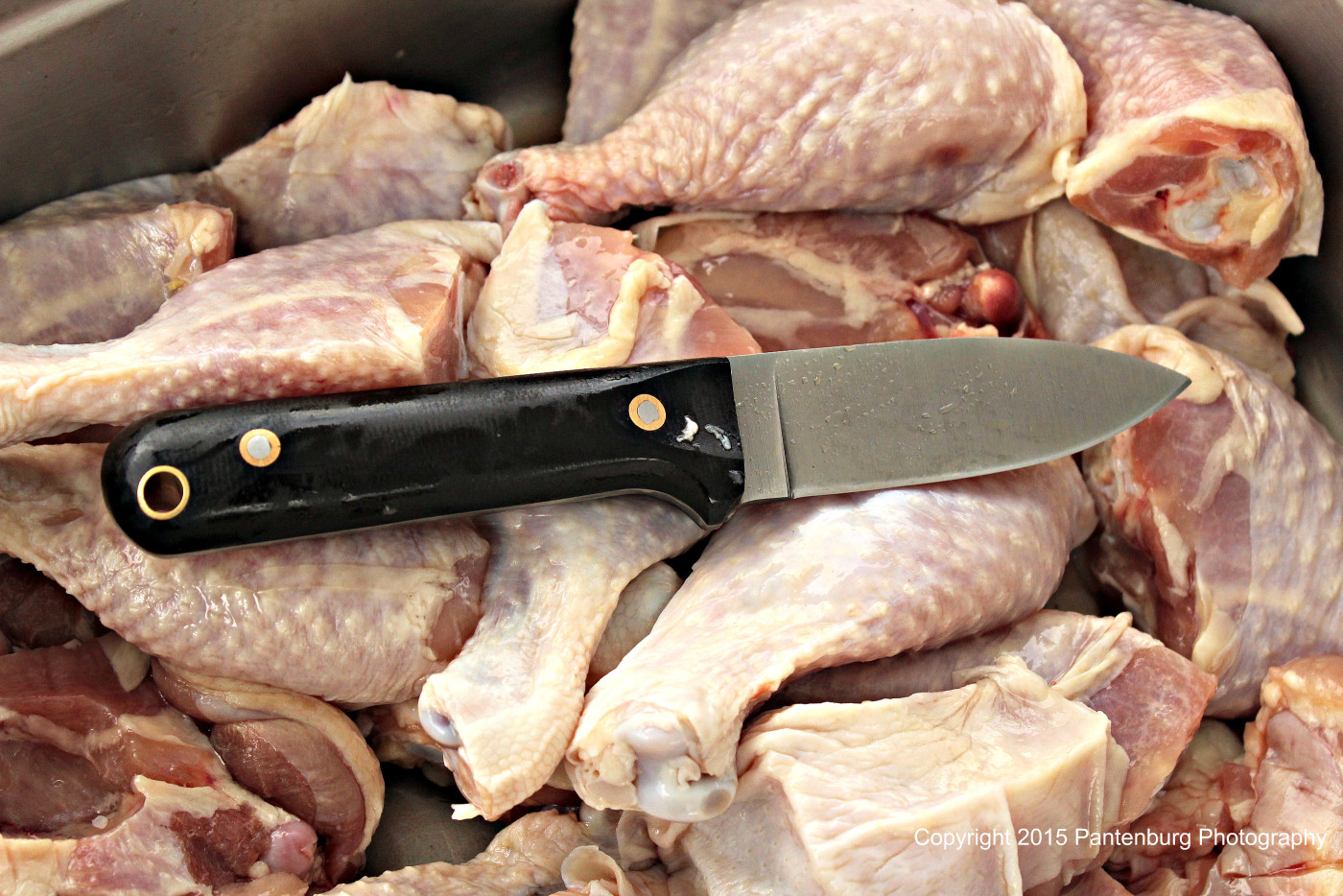

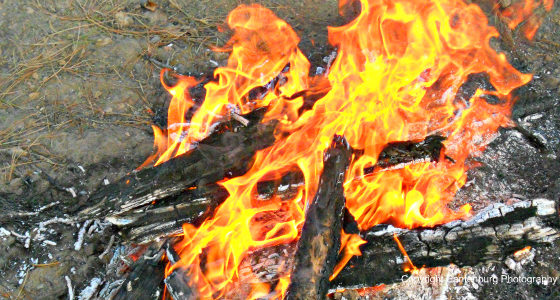
Leave a Reply